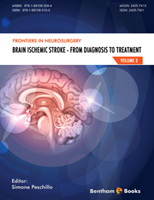Abstract
Ischemic strokes caused by the complete occlusion of an intracranial artery are associated with poor outcomes overall, and high mortality rates. To improve the survival and the outcome otherwise not afforded by the available medical and interventional therapies a neurosurgical approach must be considered. In selected patients a microsurgical embolectomy and a decompressive craniectomy are effective therapies with which to treat occlusions of the middle cerebral artery or other territories when thrombolysis or an interventional endovascular embolectomy does not restore the vascular flow. A bypass procedure that employs a superficial temporal artery-to-middle cerebral artery (STA-to-MCA) surgical anastomosis can be performed to improve the blood flow in a deficient artery chronic angiopathic disorder.
Keywords: Bypass, Decompressive craniectomy, Encephalo-myo-synangiosis, Ischemia, Intracranial pressure, Microsurgical embolectomy, Middle cerebral artery, Neurosurgery, Stroke.






















